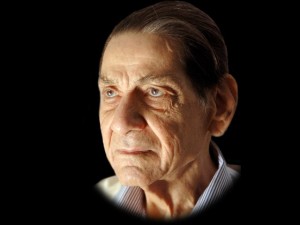A tribute to: My grandfather – Minhaj Barna
Friday, November 4th, 2011 8:26:57 by Momina Khan
A tribute to: My grandfather – Minhaj Barna
It was on the 14th of January this year that I realized I had lost a library which I always took for granted. I never really knew what contributions he had made for this country until journalists and political figures
swarmed my house that sad day – it was my grandfather Minhaj Muhammad Khan aka Minhaj Barna
While friends and admirers continue to recount fond memories of iconic journalist and trade unionist Minhaj Burna and remember his struggle for the welfare of journalists and media workers, there are many among the younger entrants
in the profession, who do not know that the perks and privileges they are enjoying and the general betterment in their situation owes mainly to the sacrifices of men like the late Barna.
The fat salaries they are drawing today as reporters, feature writers and editors owe much to the hardships young newsmen like the late Barna underwent.
Born in 1925 to a conservative Rohilkhand Pathan family in Ahmadabad, Gujrat, Barna’s family originally belonged to Qaimganj in the Farrukhabad District of Uttar Pradesh.
After his early education in Ahmadabad, Barna moved to Bombay where he worked as a teacher. He then went to Delhi where he worked at the Jamia Millia, and did his graduation from there. He then joined the Communist Party of India
(CPI) to fight against British rule and he joined the All India Youth Federation and supported the local Communist Movement.
His journalistic career began from there onwards and he started to work as a reporter in an Urdu newspaper known as the Dehli Inqilaab. After partition Barna transitioned to the English press and after a master’s degree from Karachi
University. He worked for Urdu daily Azad, moved to Lahore to work for daily Imroze and later as a correspondent for the Pakistan Times.
He had several stints abroad – including as the London correspondent for Associated Press of Pakistan. His last assignment was as a Press Counsellor in New York during Benazir Bhutto’s first stint as prime minister. He also worked
for Islamabad-based English language daily, The Muslim, as its bureau chief in Karachi
Barna was elected secretary-general and President of the Pakistan Federal Union of Journalists (PFUJ) in 1969. He was also the founding chairman of the All Pakistan Newspaper Employees Confederation (APNEC).
He also played key role in the historic 10-day nationwide strike spearheaded by his senior comrades, such as Israr Ahmed and K.G. Mustafa, which culminated in the Newspapers Employees Services Condition Act, one of the acts of
the 1973 Constitution safeguarding the rights of journalists.
His progressive leaning kept the PFUJ in constant conflict with the establishment, in particular when he was its general secretary and later president. It was around that period when he went on the longest hunger strike that any
leader of any party or group had ever observed and although, it caused his health grievous harm, he still went through with it.
Barna was a man of commitment and action who remained true to his cause to the very end of his life. He explained to me that how we should uphold truth & honesty in our personal lives and although I never really understood him
at that time, he infused a resilient spirit in me to fight for our own rights, for democracy and for freedom of press and media.
The need not to compromise on principles – is one that remains extremely relevant today.
bol ki lab aazaad haiN tere, bol ki zabaaN ab tak terii hai.
Short URL: https://www.newspakistan.pk/?p=2821

















